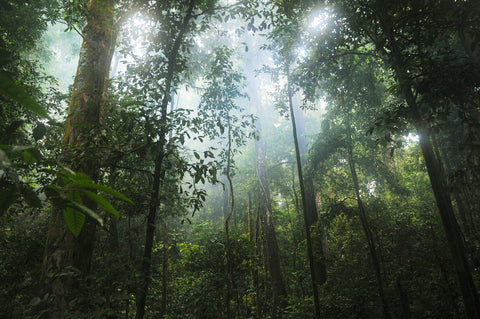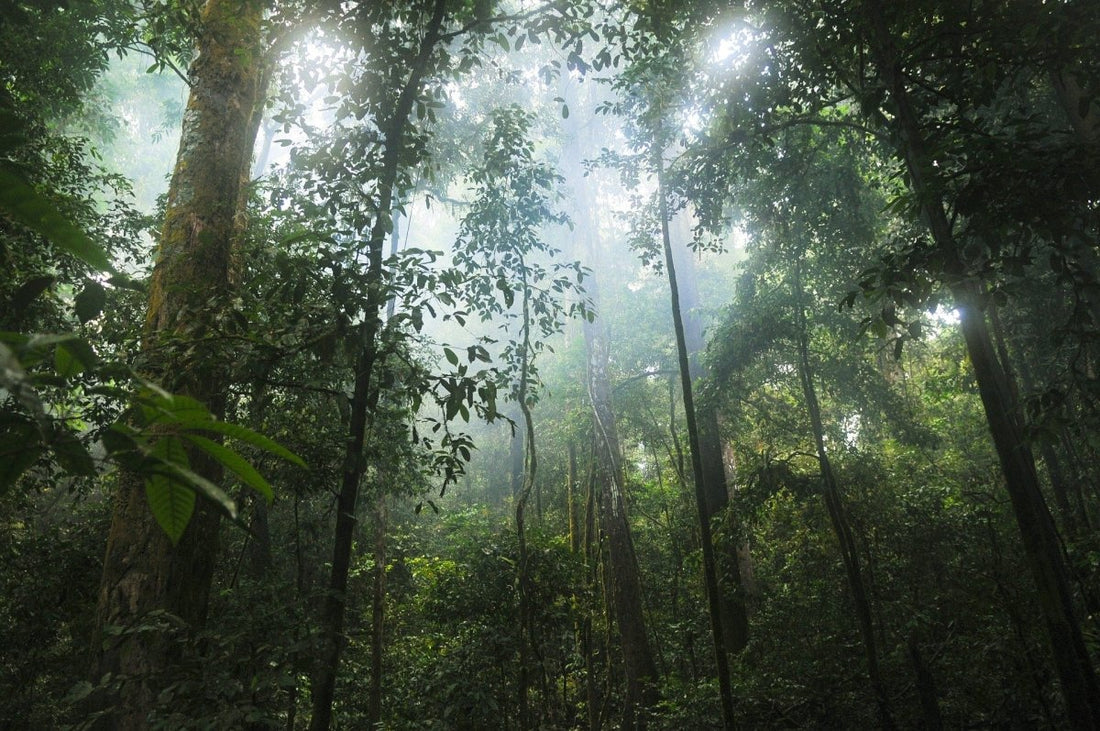More and more rainforest is being cleared around the world - the consequences are drastic. It's not just plants and creatures that are disappearing with the forest, but also many other existential things, such as the air we breathe every day.
More and more rainforest is being cleared around the world - the consequences are drastic. It's not just plants and creatures that are disappearing with the forest, but also many other existential things, such as the air we breathe every day.

Tropical forests are treasure troves
Tropical forests stretch around the equator across the planet's land masses. They are complex biotopes that are still barely accessible to humans in many areas and are therefore far from being fully explored. It is therefore not yet possible to fully appreciate what the rainforest does for our planet. However, as far as we know at present, there are plenty of good reasons to preserve rainforests.
- Home to animals and plants
- Pharmaceutical treasure trove
- Climate regulator
- Water reservoir
Rainforests are home to around two thirds of the world's animal and plant species. We are still far from knowing all the species that thrive under tropical canopies, but a quarter of all medicines are already made from substances that belong to the flora of tropical rainforests.
Globally, the rainforest plays a significant role in stabilizing the climate and groundwater. Rainforests bind CO2, which is released during slash-and-burn agriculture and thus contributes to global warming. The extent to which the rainforest influences the characteristics of the Gulf Stream cannot yet be determined. One thing is certain - without the wetlands at the equator, Europe would be uncomfortably cold. Climate change caused by the disappearance of the tropical forest would be disastrous.
In addition, enough water seeps into the soils of the rainforests to feed the water-bearing layers hundreds of kilometers away: the tropical rainforests of Africa nourish the springs of the Egyptian oases until just before the Mediterranean coast!
The richness of the rainforest benefits us all
In addition to their biodiversity and importance for the global climate, tropical forests are real treasure troves. Our everyday lives are full of products that we owe to the rainforest. These include spices, tropical fruits such as mangoes and papayas, but also products such as coffee and cocoa!
Rubber, palm oil and tropical woods are also an integral part of people's lives in industrialized countries.
Added to this is the pharmaceutical use of the "rainforest pharmacy", where new plants are discovered every year that can be used medicinally. The depths of the tropical forests are probably hiding plants that contain remedies for as yet incurable diseases. With the decline of the rainforests, we are destroying undiscovered potential for future generations. And it should not be forgotten that there are still people who live in and with the tropical forest - indigenous cultures with customs and languages, some of which are thousands of years old, which are disappearing along with the rainforest. Although they would be worth protecting as part of the human cultural heritage.
Rainforest under attack: This is how much rainforest disappears every year
More than 13 million square kilometers of the continental surface are still covered by tropical rainforests. On a positive note, it can be said that the destruction of forests is happening less rapidly today than it did a few years ago. Nevertheless, more than 60,000 square kilometers of rainforest are lost every year. This means that the home of the people and animals who previously found their livelihood here is also disappearing.
The causes of the destruction
The causes of deforestation are manifold. One of the worst culprits is deforestation for grazing land and the cultivation of animal feed for factory farming. But deforestation to establish palm oil plantations is also a cause of forest destruction. The presence of mineral resources under the forest floor also often seals the fate of forest stands. And, of course, it is not only large corporations and industries, but also small farmers, who are attacking the rainforest in search of a livelihood.
The consequences of clear-cutting
With every piece of tropical forest that disappears, deforestation next continues. This not only leads to the extinction of numerous species, but also disrupts the global climate and affects the planet's water cycle. Large-scale deforestation increases the risk of soil erosion, drought disasters and flooding, and landslides also occur more frequently. Protecting the rainforest therefore concerns us all. The whole of humanity is dependent on the treasure trove of the tropical forest, the lungs of the earth. And everyone can make a contribution. Even small changes in our own consumer behavior can help to reduce the burden on our planet's natural resources. This is not difficult and often even goes hand in hand with an improved attitude to life.
Protecting the forests: What each individual can do
For example, when buying food consciously - if you buy from local producers in season, for example at the market or from farmers, you get high-quality products, often without plastic packaging and in many cases from controlled cultivation. Whether it's fruit and vegetables or organic meat, you can taste the difference! And by the way, you're getting out of the global logistics that ship food around the world with horrendous CO2 emissions.
If you go one step further, you can leave your car at home, cycle or walk and do something good for your own health and the rainforest. In any case: don't fill up with biofuel!
You can also reduce your own paper consumption and switch to recycled products or alternative paper. Not all alternatives are unsightly gray anymore! It goes without saying that you should do without plastic as far as possible and it's also fun to use pretty fabric bags that can also be washed!
Actively contribute to reforestation
The deforestation of rainforest areas is not the end of the world. Numerous organizations around the world are counteracting the loss of tropical forests by planting trees. In the Sierra del Lacandón National Park, for example, an area of 33,000 hectares of rainforest has been reforested thanks to donations. By monitoring biodiversity and deploying forest rangers, such areas can be protected and the destruction slowed down. The most effective way to protect the rainforest in the long term is to involve local organizations and develop new sources of income for the inhabitants of the affected areas.
We at NIKIN are committed to protecting forests. In cooperation with our partner OneTreePlanted, we plant a Tree for every purchase in our online store!




















